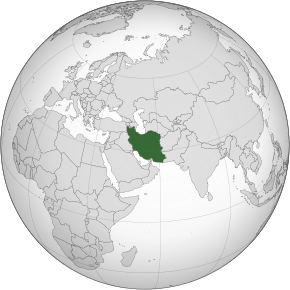More languages
More actions
| Islamic Republic of Iran جمهوری اسلامی ایران | |
|---|---|
Motto: Independence, Freedom, Islamic Republic | |
 | |
| Capital and largest city | Tehran |
| Official languages | Persian |
| Religion | Islam |
| Dominant mode of production | State capitalism |
| Government | Capitalist presidential republic |
• Leader[1] | Great Ayatollah Sayyid Ali Khamenei |
• President | Dr. Hassan Rohani |
• Vice President | Eshaq Jahangiri |
• Speaker of the Islamic Consultative Assembly | Mohammad Ghalibaf |
| History | |
| 1979 Feb 12th | |
| Area | |
• Total | 1,648,195 km² |
| Population | |
• 2017 estimate | 79,926,270 |
| Currency | Iranian Rial |
The Islamic Republic of Iran, also called Persia[2] and Iran, is a country in Western Asia. It is the second-largest country in the Middle East, and its capital and largest city is Tehran. The modern government of Iran is an Islamic republic that includes elements of a presidential democracy, which was installed by a popular revolution against the USA-backed monarchy of the Shah.
Iran is a frequent target of US and NATO aggression, which is justified through fearmongering over the prospect of Iran starting a nuclear war, despite them having no motive to do so. The acts of aggression perpetrated by NATO include the use of sanctions to restrict access to essentials such as medicine, which harms the entire population. Because of this, Iran often forms strategic alliances with other anti-NATO forces, including Russia, Syria, Hezbollah and some Marxist-Leninist organisations such as the Popular Front for the Liberation of Palestine (PFLP). However, it should be noted that the Iranian state is capitalist and therefore actively suppresses Marxist ideology within Iran itself.
Iran's geography makes it geo-strategically important for the modern global oil markets, as it is the northern coast of the Straight of Hormuz which is a maritime chokepoint through which a third of the world's liquefied natural gas and a quarter of global oil trade passes through.
Iran's economy is dominated by state-owned enterprises, which make up 60% of the total GDP.
A unique feature of Iran's economy is the presence of large religious foundations called Bonyad, whose combined budgets represent more than 30 percent of central government spending.[3]
Historically, Iran has had ties with the Black liberation movement and the Nation of Islam.[4]
History
Early history
Iran is home to one of the world's oldest civilizations,[5][6] beginning with the formation of the Elamite kingdoms in the fourth millennium BCE.
Pahlavi monarchy
In 1953, the CIA overthrew democratically elected prime minister Mohammad Mossaddegh after he threatened to nationalize the oil industry, which would decrease profits for British companies.[7] After the coup, Mossaddegh was replaced by the autocrat Mohammad Reza Pahlavi.
Islamic Republic
After the 1979 Iranian revolution, the Bonyads were nationalized and renamed with the declared intention of redistributing income to the poor and families of martyrs.[8]
In January 2020, the United States assassinated General Qasem Soleimani with a drone strike.[9]
In June 2022, Iran signed a bilateral trade agreement with the Donetsk People's Republic at the Saint Petersburg International Economic Forum.[10] Iran also signed a cooperation plan with Venezuela and Supreme Leader Ali Khamenei said that Iran and Venezuela "have closer ties with each other than any other country."[11]
References
- ↑ Islamic Republic of Iran. "General View of Iran"
- ↑ “"Iran" and "Persia" are synonymous. The former has always been used by the Iranian speaking peoples themselves, while the latter has served as the international name of the country in various languages”
Joshua A. Fishman (2010). Handbook of Language and Ethnic Identity: Disciplinary and Regional Perspectives (Volume 1) (p. 266). Oxford University Press. ISBN 978-0-19-537492-6 - ↑ Bonyad-e Mostazafan va Janbazan Oppressed and Disabled Veterans Foundation (MJF). Globalsecurity.org. Retrieved February 6, 2011.
- ↑ The Nation of Islamic Republic of Iran with Setareh Sadeqi on Historic.ly podcast by Esha Krishnaswamy and Robert Grannies - Aug 22
- ↑ Christopher Whatley (2001). Bought and Sold for English Gold: The Union of 1707. Tuckwell Press.
- ↑ Lowell Barrington (2012). Comparative Politics: Structures and Choices, 2nd ed.tr: Structures and Choices (p. 121). Cengage Learning. ISBN 978-1-111-34193-0
- ↑ Scott A. Koch (1998). THE CENTRAL INTELLIGENCE AGENCY AND THE FALL OF IRANIAN PRIME MINISTER MOHAMMED MOSSADEQ, AUGUST 1953. [PDF] Washington, DC: Central Intelligence Agency.
- ↑ https://www.mei.edu/publications/iranian-para-governmental-organizations-bonyads
- ↑ Tom O'Connor, James Laporta (2020-01-02). "Iraq Militia Officials, Iran's Quds Force Head Killed in U.S. Drone Strike" Newsweek. Archived from the original on 2020-01-03. Retrieved 2022-01-03.
- ↑ "Iran and Donetsk Sign Agreement To Strengthen Trade Relations" (2022-06-18). TeleSur.
- ↑ Benjamin Norton (2022-06-11). "Venezuela and Iran sign 20-year cooperation plan, Maduro pledges joint ‘anti-imperialist struggle’" Multipolarista. Archived from the original on 2022-06-24. Retrieved 2022-06-28.


